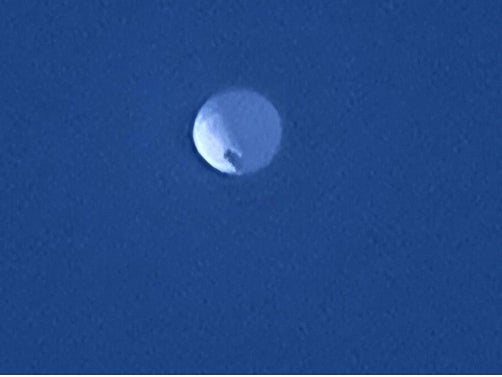Could the China ‘spy’ balloon be linked to Montana’s nuclear missile sites?
150 warheads located at Malmstrom Air Force Base
Your support helps us to tell the story
From reproductive rights to climate change to Big Tech, The Independent is on the ground when the story is developing. Whether it's investigating the financials of Elon Musk's pro-Trump PAC or producing our latest documentary, 'The A Word', which shines a light on the American women fighting for reproductive rights, we know how important it is to parse out the facts from the messaging.
At such a critical moment in US history, we need reporters on the ground. Your donation allows us to keep sending journalists to speak to both sides of the story.
The Independent is trusted by Americans across the entire political spectrum. And unlike many other quality news outlets, we choose not to lock Americans out of our reporting and analysis with paywalls. We believe quality journalism should be available to everyone, paid for by those who can afford it.
Your support makes all the difference.A suspected Chinese spy ballon was traveling over a number of sensitive sites in the US, a defence official has said, triggering speculation its location and route could be linked to Montana’s nuclear missile sites.
A Pentagon official told a press briefing in Washington DC the suspected balloon had been spotted over Billings, Montana, on Wednesday.
It had first flown over the Aleutian Islands, through Canada, and into Montana.
The official said the balloon – which China confirmed responsibility for – was still over the US but declined to say where it is now, Reuters said. Officials said steps had been taken to “protect against the collection of sensitive information”.
Montana has long been the location for some of the US’s nuclear arsenal and is home to one of three known major nuclear missile silo fields. The other two are in Wyoming and North Dakota.
The Air Force at Malmstrom maintains 150 intercontinental ballistic missile silos across its 13,800-square-mile complex in central Montana, according to the Pentagon.
“Clearly the intent of this balloon is for surveillance,” the official, briefing reporters anonymously, said on Thursday.
Brig Gen Patrick Ryder, a Pentagon press secretary, said in a statement: “[The balloon] currently traveling at an altitude well above commercial air traffic and does not present a military or physical threat to people on the ground.”
He added: “Instances of this kind of balloon activity have been observed previously over the past several years. Once the balloon was detected, the US government acted immediately to protect against the collection of sensitive information.”
Reports said the US did scramble fighter jets, including F-22s, to potentially shoot down the balloon if ordered to by the White House.

The Pentagon ultimately recommended against it, saying that even as the balloon was over a sparsely populated area of Montana, its size would create a dangerously large debris field.
China initially reacted to reports of the balloon on Friday morning by saying it was looking into those reports and urging officials in Washington to remain calm as Beijing had “no intention of violating the territory and airspace of any sovereign country”.
“China is a responsible country and has always strictly abided by international laws, and China has no intention of violating the territory and airspace of any sovereign country,” foreign ministry spokesperson Mao Ning said.
“Speculation and hype are not conducive until the facts are clear.”
Without denying the reports, the spokesperson added: “As for the balloon, as I’ve mentioned just now, we are looking into and verifying the situation and hope that both sides can handle this together calmly and carefully.”
The top official also said politicians and the public should withhold judgement “before we have a clear understanding of the facts” about the spy balloon sightings.
In a subsequent statement, the foreign ministry claimed the balloon is a “civilian airship” that had blown off course due to wind.
“The airship is from China. It is a civilian airship used for research, mainly meteorological, purposes,” the statement read. “Affected by the Westerlies and with limited self-steering capability, the airship deviated far from its planned course.
“The Chinese side regrets the unintended entry of the airship into US airspace due to force majeure. The Chinese side will continue communicating with the US side and properly handle this unexpected situation caused by force majeure.”
At a press briefing on Friday, Brig Gen Ryder flatly rejected Beijing’s claims that the airship was a meteorological research ballon.
He said the US was continuing to weigh its options and described the airship’s presence as an “unacceptable” violation of US airspace.
“We are aware of the (People’s Republic of China) statement. However, the fact is, we know that it’s a surveillance balloon.”
He said the balloon was moving eastward over the centre of the United States at an altitude of 60,000 feet on Friday.
He refused to give precise details about the airship’s location, adding: “The public certainly has the ability to look up in the sky and see where the balloon is.”
The balloon has the ability to maneuver and had “changed course”, he said.
The reports of the balloon came as the US and China continue to spar diplomatically over each other’s actions and influence in the Asia-Pacific region.
Secretary of State Antony Blinken postponed a planned visit to Beijing this weekend, amid growing tensions between the superpowers.
Meanwhile, earlier this week the US did a deal with the Philippines to secure access to four additional military bases.
The move is seen as part of Washington’s efforts to strengthen its presence in the region, from South Korea and Japan in the north to Australia in the south, with the purported aim of protecting Taiwan from Beijing.
Malmstrom Air Force Base dates from before the Cold War and was first established in 1939.



Join our commenting forum
Join thought-provoking conversations, follow other Independent readers and see their replies
Comments